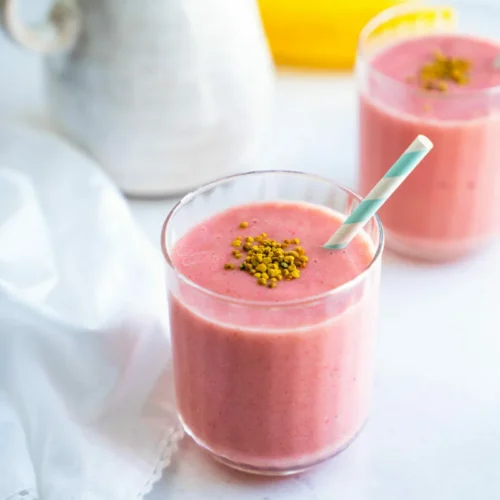Almond milk has become a popular choice for smoothies, thanks to its creamy texture, rich flavor, and health benefits.
It’s an excellent dairy-free option for those who are lactose intolerant or simply prefer a plant-based alternative.
However, there might be times when you don’t have almond milk on hand or simply want to try something different.
So, what are the best substitutes for almond milk in smoothies? The best alternatives to almond milk for your smoothies include coconut milk, soy milk, oat milk, cashew milk, and rice milk. Each of these options provides a unique flavor and texture, while still offering various health benefits.
No almond milk?
No problem!
With these substitutes, you can still create a delicious and nutritious smoothie that caters to your tastes and dietary preferences.
Let’s dive in and explore these alternatives, shall we?
Why Use Almond Milk In Smoothies?

Almond milk is a popular ingredient in smoothies because it is a dairy-free, plant-based milk that can help achieve a creamy texture.
It is also a great option for people who are lactose intolerant or following a vegan diet.
Almond milk is low in calories and fat, contains no cholesterol, and is a good source of vitamin E, which is an antioxidant that helps protect cells from damage.
Additionally, almond milk is rich in calcium, which is important for bone health, and is often fortified with vitamin D, which helps the body absorb calcium.
When making a smoothie with almond milk, it is important to choose an unsweetened variety to avoid adding extra sugar to the drink.
Overall, almond milk is a nutritious and delicious alternative to dairy milk in smoothies.
The 5 Best Substitutes for Almond Milk in Smoothies
Almond milk is a popular choice for smoothies, but it’s not always the healthiest option.
If you’re looking for an alternative to almond milk in your smoothie recipes, here are five great substitutes that will offer similar health benefits without sacrificing taste:
1. Coconut Milk

Coconut milk is a rich and creamy liquid extracted from the flesh of mature coconuts.
It has a slightly sweet and nutty taste, making it a fantastic alternative to almond milk in smoothies.
The consistency of coconut milk is similar to that of almond milk, providing a smooth and velvety texture to any blended drink.
Because it is dairy-free, coconut milk is an excellent choice for those with lactose intolerance, as well as individuals following a vegan or paleo diet.
When using coconut milk in smoothies, it is essential to select the unsweetened variety to avoid excessive sugar content.
In addition, coconut milk has a naturally cooling effect, which can be highly refreshing in a fruit or vegetable-based smoothie.
2. Soy Milk

Soy milk is another popular plant-based milk alternative made from whole soybeans or soy protein isolate.
It has a mild and slightly beany taste, which can complement the flavors of various ingredients in smoothies.
Soy milk offers a creamy texture, making it an ideal substitute for almond milk in blended beverages.
One of the primary benefits of using soy milk is its high protein content, making it an excellent choice for those seeking a post-workout snack or a nutrient-dense breakfast option.
Soy milk is also available in various flavors, such as vanilla and chocolate, which can enhance the taste of smoothies even further.
When choosing a soy milk brand, it’s best to opt for unsweetened and non-GMO products to maintain a healthy and natural smoothie.
3. Oat Milk

Oat milk is a relatively new addition to the plant-based milk market, but it has quickly gained popularity due to its creamy texture and mild, slightly sweet taste.
Made from soaked oats that are blended and strained, oat milk is an excellent alternative to almond milk in smoothies.
It is a fantastic option for those with nut allergies or sensitivities, as well as individuals following a vegan or dairy-free diet.
Oat milk can be used in a variety of smoothie recipes, from fruit-based concoctions to protein-packed blends.
When using oat milk in smoothies, it is essential to select an unsweetened variety to ensure a balanced and nutritious beverage.
The smooth, creamy texture of oat milk can make any smoothie feel indulgent while still providing an array of health benefits.
4. Cashew Milk

Cashew milk is a rich and creamy non-dairy milk alternative made from cashews and water.
Its smooth texture makes it an excellent choice for blending into smoothies, providing a velvety consistency that is similar to almond milk.
In addition to its luxurious mouthfeel, cashew milk also boasts a subtle nutty flavor that complements a wide range of fruits, vegetables, and other smoothie ingredients.
Many store-bought cashew milk options are available, but homemade cashew milk is simple to make by blending soaked cashews with water and straining the mixture through a cheesecloth or nut milk bag.
For those with almond allergies or simply looking for a new twist on their favorite smoothie recipes, cashew milk is a must-try substitute.
5. Rice Milk

Rice milk is a light and refreshing plant-based milk alternative made from rice and water.
It has a thinner consistency compared to almond milk, making it an ideal option for those who prefer a less creamy texture in their smoothies.
The mild taste of rice milk allows the flavors of the other smoothie ingredients to shine through, making it an excellent choice for fruit-based or green smoothies.
Rice milk can be found at most grocery stores, and there are even flavored varieties such as vanilla or chocolate, which can add an extra layer of flavor to your smoothie creations.
For those seeking a low-fat, hypoallergenic, and versatile milk substitute in their smoothies, rice milk is an option worth considering.
Frequently Asked Questions (FAQs)
What can I use instead of almond milk?
Instead of almond milk, you can use other plant-based milks such as soy milk, oat milk, coconut milk, hemp milk or rice milk. Each of these options has its own unique taste and texture, so it’s best to experiment and see which one you like best.
Can you use regular milk instead of almond milk for smoothies?
Yes, you can use regular milk instead of almond milk for smoothies. However, keep in mind that regular milk is not vegan or lactose-free, and it may also contain more calories and fat than almond milk.
Can you use water instead of almond milk in smoothies?
Yes, you can use water instead of almond milk in smoothies. However, keep in mind that water will not provide the same creaminess and flavor as almond milk, so you may need to add other ingredients to achieve the desired texture and taste.
What milk alternative is best for smoothies?
The best milk alternative for smoothies depends on personal preference and dietary needs. Some popular options include soy milk, oat milk, coconut milk and almond milk. Soy milk is high in protein, while oat milk is naturally sweet and creamy. Coconut milk is rich and flavorful, while almond milk is low in calories and fat.
Conclusion
In conclusion, there are several great substitutes for almond milk that can be used in smoothies.
Cashew milk, coconut milk, soy milk, oat milk, and hemp milk are all delicious and nutritious options that can help achieve a creamy texture and add flavor to your smoothies.
Each of these milk alternatives has its own unique taste and nutritional benefits, so it’s important to choose the one that best fits your dietary needs and personal preferences.
Whether you’re vegan, lactose intolerant, or simply looking to switch up your smoothie routine, these five substitutes for almond milk are sure to satisfy your taste buds and provide a healthy boost to your day.

The 5 Best Substitutes for Almond Milk in Smoothies
Ingredients
- Coconut Milk
- Soy Milk
- Oat Milk
- Cashew Milk
- Rice Milk
Instructions
- Pick your favorite substitute from the list above.
- Follow cooking directions for your selected substitute with the proper ratio of ingredients.
Jenny has always been passionate about cooking, and she uses her platform to share her joy of food with others. Her recipes are easy to follow, and she loves giving tips and tricks to help others create their own unique culinary creations.

